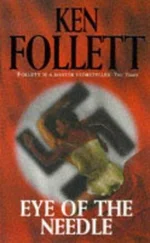Ken Follett - Winter of the World (Century Trilogy 2)
Здесь есть возможность читать онлайн «Ken Follett - Winter of the World (Century Trilogy 2)» весь текст электронной книги совершенно бесплатно (целиком полную версию без сокращений). В некоторых случаях можно слушать аудио, скачать через торрент в формате fb2 и присутствует краткое содержание. Жанр: Старинная литература, на английском языке. Описание произведения, (предисловие) а так же отзывы посетителей доступны на портале библиотеки ЛибКат.
- Название:Winter of the World (Century Trilogy 2)
- Автор:
- Жанр:
- Год:неизвестен
- ISBN:нет данных
- Рейтинг книги:5 / 5. Голосов: 2
-
Избранное:Добавить в избранное
- Отзывы:
-
Ваша оценка:
- 100
- 1
- 2
- 3
- 4
- 5
Winter of the World (Century Trilogy 2): краткое содержание, описание и аннотация
Предлагаем к чтению аннотацию, описание, краткое содержание или предисловие (зависит от того, что написал сам автор книги «Winter of the World (Century Trilogy 2)»). Если вы не нашли необходимую информацию о книге — напишите в комментариях, мы постараемся отыскать её.
Winter of the World (Century Trilogy 2) — читать онлайн бесплатно полную книгу (весь текст) целиком
Ниже представлен текст книги, разбитый по страницам. Система сохранения места последней прочитанной страницы, позволяет с удобством читать онлайн бесплатно книгу «Winter of the World (Century Trilogy 2)», без необходимости каждый раз заново искать на чём Вы остановились. Поставьте закладку, и сможете в любой момент перейти на страницу, на которой закончили чтение.
Интервал:
Закладка:
Sir Brian wanted to supply the city by air. Most people thought that was impossible. Someone calculated that Berlin required 4,000 tons of fuel and food per day. Were there enough airplanes in the world to move that much stuff? No one knew. Nevertheless, Sir Brian ordered the Royal Air Force to make a start.
On Friday afternoon Sir Brian went to see Clay, and Lloyd was invited to be part of the entourage. Sir Brian said to Clay: ‘The Russians might block the autobahn ahead of your convoy, and wait and see if you have the nerve to attack them; but I don’t think they’ll shoot planes down.’
‘I don’t see how we can deliver enough supplies by air,’ Clay said again.
‘Nor do I,’ said Sir Brian. ‘But we’re going to do it until we think of something better.’
Clay picked up the phone. ‘Get me General LeMay in Wiesbaden,’ he said. After a minute he said: ‘Curtis, have you got any planes there that can carry coal?’
There was a pause.
‘Coal,’ said Clay more loudly.
Another pause.
‘Yes, that is what I said – coal.’
A moment later, Clay looked up at Sir Brian. ‘He says the US Air Force can deliver anything.’
The British returned to their headquarters.
On Saturday Lloyd got an army driver and went into the Soviet zone on a personal mission. He drove to the address at which he had visited the von Ulrich family fifteen years ago.
He knew that Maud was still living there. His mother and Maud had resumed correspondence at the end of the war. Maud’s letters put a brave face on what was undoubtedly severe hardship. She did not ask for help, and anyway there was nothing Ethel could do for her – rationing was still in force in Britain.
The place looked very different. In 1933 it had been a fine town house, a little run down but still gracious. Now it looked like a dump. Most of the windows had boards or paper instead of glass. There were bullet holes in the stonework, and the garden wall had collapsed. The woodwork had not been painted for many years.
Lloyd sat in the car for a few moments, looking at the house. Last time he came here he had been eighteen, and Hitler had only just become Chancellor of Germany. The young Lloyd had not dreamed of the horrors the world was going to see. Neither he nor anyone else had suspected how close Fascism would come to triumphing over all Europe, and how much they would have to sacrifice to defeat it. He felt a bit like the von Ulrich house looked, battered and bombed and shot at but still standing.
He walked up the path and knocked.
He recognized the maid who opened the door. ‘Hello, Ada, do you remember me?’ he said in German. ‘I’m Lloyd Williams.’
The house was better inside than out. Ada showed him up to the drawing room, where there were flowers in a glass tumbler on the piano. A brightly patterned blanket had been thrown over the sofa, no doubt to hide holes in the upholstery. The newspapers in the windows let in a surprising amount of light.
A two-year-old boy walked into the room and inspected him with frank curiosity. He was dressed in clothes that were evidently homemade, and he had an Oriental look. ‘Who are you?’ he said.
‘My name is Lloyd. Who are you?’
‘Walli,’ he said. He ran out again, and Lloyd heard him say to someone outside: ‘That man talks funny!’
So much for my German accent, Lloyd thought.
Then he heard the voice of a middle-aged woman. ‘Don’t make such remarks! It’s impolite.’
‘Sorry, Grandma.’
Next moment Maud walked in.
Her appearance shocked Lloyd. She was in her mid-fifties, but looked seventy. Her hair was grey, her face was gaunt, and her blue silk dress was threadbare. She kissed his cheek with shrunken lips. ‘Lloyd Williams, what a joy to see you!’
She’s my aunt, Lloyd thought with a rather queer feeling. But she did not know that: Ethel had kept the secret.
Maud was followed by Carla, who was unrecognizable, and her husband. Lloyd had met Carla as a precocious eleven-year-old: now, he calculated, she was twenty-six. Although she looked half-starved – most Germans did – she was pretty, and had a confident air that surprised Lloyd. Something about the way she stood made him think she might be pregnant. He knew from Maud’s letters that Carla had married Werner, who had been a handsome charmer back in 1933 and was still the same.
They spent an hour catching up. The family had been through unimaginable horror, and said so frankly, yet Lloyd still had a sense that they were editing out the worst details. He told them about Daisy, Evie and Dave. During the conversation a teenage girl came in and asked Carla if she could go to her friend’s house.
‘This is our daughter, Rebecca,’ Carla said to Lloyd.
She was about sixteen, so Lloyd supposed she must be adopted.
‘Have you done your homework?’ Carla asked the girl.
‘I’ll do it tomorrow morning.’
‘Do it now, please,’ Carla said firmly.
‘Oh, Mother!’
‘No argument,’ said Carla. She turned back to Lloyd, and Rebecca stomped out.
They talked about the crisis. Carla was deeply involved, as a city councillor. She was pessimistic about the future of Berlin. She thought the Russians would simply starve the population until the West gave in and handed the city over to total Soviet control.
‘Let me show you something that may make you feel differently,’ Lloyd said. ‘Will you come with me in the car?’
Maud stayed behind with Walli, but Carla and Werner went with Lloyd. He told the driver to take them to Tempelhof, the airport in the American zone. When they arrived he led them to a high window from which they could look down on the runway.
There on the tarmac were a dozen C-47 Skytrain aircraft lined up nose to tail, some with the American star, some with the RAF roundel. Their cargo doors were open, and a truck stood at each one. German porters and American airmen were unloading the aircraft. There were sacks of flour, big drums of kerosene, cartons of medical supplies, and wooden crates containing thousands of bottles of milk.
While they watched, empty aircraft were taking off and more were coming in to land.
‘This is amazing,’ said Carla, her eyes glistening. ‘I’ve never seen anything like it.’
‘There has never been anything like it,’ Lloyd replied.
She said: ‘But can the British and Americans keep it up?’
‘I think we have to.’
‘But for how long?’
‘As long as it takes,’ said Lloyd firmly.
And they did.
25
1949
Almost halfway through the twentieth century, on 29 August 1949, Volodya Peshkov was on the Ustyurt Plateau, east of the Caspian Sea in Kazakhstan. It was a stony desert in the deep south of the USSR, where nomads herded goats in much the same way as they had in Bible times. Volodya was in a military truck that bounced uncomfortably along a rough track. Dawn was breaking over a landscape of rock, sand, and low thorny bushes. A bony camel, alone beside the road, stared malevolently at the truck as it passed.
In the dim distance, Volodya saw the bomb tower, lit by a battery of spotlights.
Zoya and the other scientists had built their first nuclear bomb according to the design Volodya had got from Willi Frunze in Santa Fe. It was a plutonium device with an implosion trigger. There were other designs, but this one had worked twice before, once in New Mexico and once at Nagasaki.
So it should work today.
The test was codenamed RDS-1, but they called it First Lightning.
Volodya’s truck pulled up at the foot of the tower. Looking up, he saw a clutch of scientists on the platform, doing something with a snake’s nest of cables that led to detonators on the skin of the bomb. A figure in blue overalls stepped back, and there was a toss of blonde hair: Zoya. Volodya felt a flush of pride. My wife, he thought; top physicist and mother of two.
Читать дальшеИнтервал:
Закладка:
Похожие книги на «Winter of the World (Century Trilogy 2)»
Представляем Вашему вниманию похожие книги на «Winter of the World (Century Trilogy 2)» списком для выбора. Мы отобрали схожую по названию и смыслу литературу в надежде предоставить читателям больше вариантов отыскать новые, интересные, ещё непрочитанные произведения.
Обсуждение, отзывы о книге «Winter of the World (Century Trilogy 2)» и просто собственные мнения читателей. Оставьте ваши комментарии, напишите, что Вы думаете о произведении, его смысле или главных героях. Укажите что конкретно понравилось, а что нет, и почему Вы так считаете.












